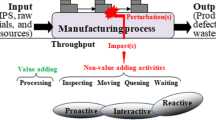Abstract
Nowadays, manufacturers have to share some of their resources with partners due to the competitive economic environment. The management of the availability periods of shared resources causes a problem because it is achieved by the scheduling systems, which assume a local environment where all resources are on the same site. Therefore, distributed scheduling with shared resources is an important research topic. In this communication, we introduce the architecture and behaviour of DSCEP framework (Distributed, Supervisor, Customer, Environment, and Producer) under shared resources situation with disturbances. We are using a simple example of manufacturing system to illustrate the ability of DSCEP framework to solve the shared resources scheduling problem in complex systems.











Similar content being viewed by others
References
Archimede, B., & Coudert, T. (2001). Reactive scheduling using a multi-agent model: The SCEP framework. Engineering Application of Artificial Intelligence, 14, 667–683.
Azadegan, A., Porobic, L., Ghazinoory, S., Samouei, P., & Kheirkhah, A. S. (2011). Fuzzy logic in manufacturing: A review of literature and a specialized application. International Journal of Production Economics, 132(2), 258–270.
Balaji, P. G., & Srinicasan, D. (2010). An introduction to multi-agent systems. Studies in Computational Intelligence, 310, 1–27.
Blazewicz, J., Ecker, K. H., Pesch, E., Schmidt, G., & Weglarz, J. (2001). Scheduling computer and manufacturing processes. Berlin: Springer.
Chan, F., Chan, H., & Kazerooni, A. (2003). Real time fuzzy scheduling rules in FMS. Journal of Intelligent Manufacturing, 14(34), 341–350.
Dechter, R. (2003). Constraint processing. San Francisco: Morgan Kaufmann.
Ennigrou, M., & Ghedira, K. (2008). New local diversification techniques for flexible job shop scheduling problem with a multi-agent approach. Autonomous Agents and Multi-Agent Systems, 17(2), 270–287.
Galvin, S. (1994). Operating system concepts distributed file systems. Reading: Addison-Wesley.
Gendreau, M., & Potvin, J. Y. (2010). Handbook of metaheuristics. International Series in Operations Research and Management Science, 146, 41–59.
Goncalvesa, J. F., Mendesb, J. J. M., & Resende, M. G. C. (2008). A genetic algorithm for the resource constrained multi-order scheduling problem. European Journal of Operational Research, 189(3), 1171–1190.
Kornienko, S., Kornienko, O., & Priese, J. (2004). Application of multi-agent planning to the assignment problem. Computers in Industry, 54(3), 273–290.
Korsvik, J. E., Fagerholt, K., & Laporte, G. (2010). A tabu search heuristic for ship routing and scheduling. Journal of the Operational Research Society, 61, 594–630.
Kouider, A., & Bouzouia, B. (2012). Multi-agent job shop scheduling system based on co-operative approach of idle time minimization. International Journal of Production Research, 50(2), 409–424.
Molina, A., & Sanchez, J. M. (1998). The virtual enterprise. In Handbook of life cycle engineering: Concepts, models and technologies, vol. 3, pp. 59–89.
Nejad, H. T. N., Sugimura, N., & Iwamura, K. (2011). Agent-based dynamic integrated process planning scheduling in flexible manufacturing systems. International Journal of Production Research, 49(5), 1373–1389.
Ouelhadj, D., & Petrovic, S. (2009). A survey of dynamic scheduling in manufacturing systems. Journal of Scheduling, 12(4), 417–431.
Passos, C.A.S., Iha, V.M., & Dominiquini, R.B. (2010). A multi-agents approach to solve job shop scheduling problems using metaheuristics, 5th conference on management and control of production and logistic.
Restrepo, I., & Balakrishnan, S. (2008). Fuzzy-based methodology for multi-objective scheduling in a robot-centered flexible manufacturing cell. Journal of Intelligent Manufacturing, 19(4), 421–432.
Shao, X., Li, X., Gao, L., & Zhang, C. (2009). Integration of process planning and scheduling: A modified genetic algorithm-based approach. Computer and operations Research, 36(6), 2082–2096.
Shen, W. (2002). Distributed manufacturing scheduling using intelligent agents. Intelligent Systems, 17(1), 88–94.
Shen, W., Wang, L., & Hao, Q. (2006). Agent-based distributed manufacturing process planning and scheduling: A state-of-the-art survey. IEEE Transactions on Systems, Man, and Cybernetics-Part C: Applications and Reviews, 36(4), 563–577.
Sivanandam, S. N., & Deepa, S. N. (2007). Introduction to genetic algorithms. Berlin: Springer.
Wight, O. W. (1984). Production and inventory management in the computer age. New York: Van Nostrand Reinhold.
Xiang, W., & Lee, H. P. (2008). Ant colony intelligence in multi-agent dynamic manufacturing scheduling. Engineering Application of Artificial Intelligence, 21(1), 73–85.
Xu, J., Archimede, B., & Letouzey, A. (2011). Application of using SCEP model for distributed scheduling with shared resources in hospital system. Emerging Technologies and Factory Automation (ETFA), IEEE 16th Conference.
Zhang, J., & Cao, Y. Q. (2012). Research on cooperation of multiple agent based on contract-net protocol. In International conference on industrial control and electronics engineering (ICICEE).
Zweben, M., & Fox, M. S. (1994). ISIS: A retrospective, intelligent scheduling (pp. 3–28). San Francisco, CA: Morgan Kaufmann.
Author information
Authors and Affiliations
Corresponding author
Additional information
JiuCheng Xu passed away in a car accident on June 8th 2012, at the age of 29. This article is based on his PhD work and is dedicated to him.
Rights and permissions
About this article
Cite this article
Archimede, B., Letouzey, A., Memon, M.A. et al. Towards a distributed multi-agent framework for shared resources scheduling. J Intell Manuf 25, 1077–1087 (2014). https://doi.org/10.1007/s10845-013-0748-8
Received:
Accepted:
Published:
Issue Date:
DOI: https://doi.org/10.1007/s10845-013-0748-8




